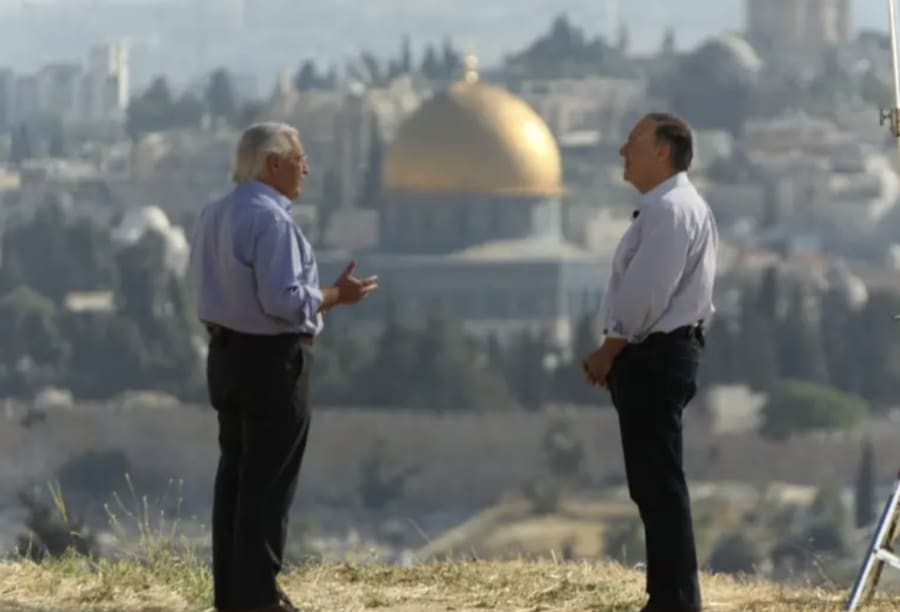Upcoming documentary on TBN highlights Israel's 'Route 60: The Road of the Patriarchs'
Peace activists hope to promote the idea of a ‘biblical highway’ through the Holy Land

Highway 60 is an important and historic highway in Israel.
The route, which is only 235 kilometers long (about 146 miles), largely follows the ancient biblical highway called “Road of the Patriarchs” a reference to the biblical patriarchs Abraham, Isaac and Jacob.
The highway connects Beersheva in southern Israel with Nazareth in the north. Along the way, it travels through or near important biblical sites like Hebron, Bethlehem, Jerusalem, Bethel and Nablus (biblical Shechem, which was rebuilt by Herod the Great and called Neopolis – New City).
While most of Route 60 crosses through the disputed territories of Judea and Samaria, its endpoint lies within Israeli territory. As a result, the route is regularly used by both Israelis and Palestinians.
In fact, many Israeli settlements can also be found along either side of the highway, with Jewish settlers and Palestinian workers using the route to travel to and from work.
Due to the presence of both groups, there are several checkpoints along Route 60. The site has also seen its share of violence, including the most recent wave of violence which began last year, as well as previous outbreaks.
In the last Netanyahu-led government, there were many calls by politicians on the Right to increase the number of checkpoints, or to close sections of the road that passed through Palestinian towns. More recently, following the killing of the two Yaniv brothers in the settlement town of Huwara, there were again calls to close the road or build a bypass around Palestinian towns.
However, it is widely recognized that if Israel were to add more checkpoints, or road closures, it would have a destructive effect on the Palestinian economy because tens of thousands of Palestinians travel the road each day just to get to work within Israel or in Israeli settlements. If they were prevented from doing so by road closures, or held up at checkpoints for hours, it would dramatically impact their livelihood.
One army officer in security who works in the Palestinian territories claimed that closing the road to Palestinians would have disastrous effects for Israel too.
“When you have a headache, you don’t lop your head off. You take an aspirin,” he said, implying that road closures would have a severe impact for both Palestinians and Israelis.
Route 60 has also seen incidents of violence perpetrated by Jewish settlers.
In October 2018, youth from the one settlement threw stones at Palestinian cars driving along Route 60, resulting in the death of 48-year-old Aisha Rabi, a Palestinian mother of eight. Five Jewish teens were later arrested in connection with the attack.
However, there are some in Israel who are working to turn the highway from a road of conflict into a path toward peace.
One group hopes to build on the history of the route, sometimes called ‘The Way of the Patriarchs,’ by focusing on the biblical figure of Abraham – the father of the three main religions in Israel – as a way to bring unity.
Yishai Fleischer, who is involved in this new project, envisions turning Route 60 into a tourist destination, where people from all over the world would visit to learn about both the ancient and modern history of the sites.
In the Bible, Abraham represents the idea of monotheism shared by Judaism, Christianity and Islam. By focusing on Abraham’s life and his connection to the “Road of the Patriarchs,” Fleischer hopes to build a bridge between Israelis and Palestinians along the route.
“I hope that in the future people will travel all the way north on that road and say, 'we are going on the biblical highway,’” Fleischer told i24 News,
By building up tourism on the “biblical highway,” Fleischer and his team hope to “bypass the tension and the politics.” He said the creation of tourist sites and building up the tourist sector along Route 60 will be something “everyone along the road will benefit from.”
“Route 60 is a way to get around the political problem,” Fleischer said. “We are talking about education, we are talking about the heritage of most of the world. So, what we are saying is, let’s put the politics aside. Let’s talk about Abraham, like the Abraham Accords.”
In September, TBN will release the documentary film “Route 60: The Biblical Highway.” The TBN Original program will follow former U.S. Ambassador to Israel David Friedman, and former U.S. Secretary of State Mike Pompeo as they make several stops along the highway and discuss their biblical significance.
Ambassador Friedman said he hopes the film will help educate people about a misunderstood region of the world.
“We went from place to place to show that, on the one hand, the history of both Judaism and Christianity began at these places. But we also show these real living, breathing places where life continues to flourish,” Friedman said.
Both Friedman, an Orthodox Jew, and Pompeo, an Evangelical Christian, said their love for Israel’s biblical history was part of their motivation for making the documentary. However, they both agreed to steer clear of politics as much as possible.
“It's not a secret to anyone that both Secretary Pompeo and I believe that this land was given by G-d to the Jewish people, and that it has enormous biblical and historical significance as part of the Jewish and Christian DNA,” Friedman commented. “And I suppose one could infer from that, that we believe that it should remain under Israeli sovereignty. So, one could surely draw that inference, but we don't dwell on it, meaning we lay out the facts and the biblical history."

The All Israel News Staff is a team of journalists in Israel.













